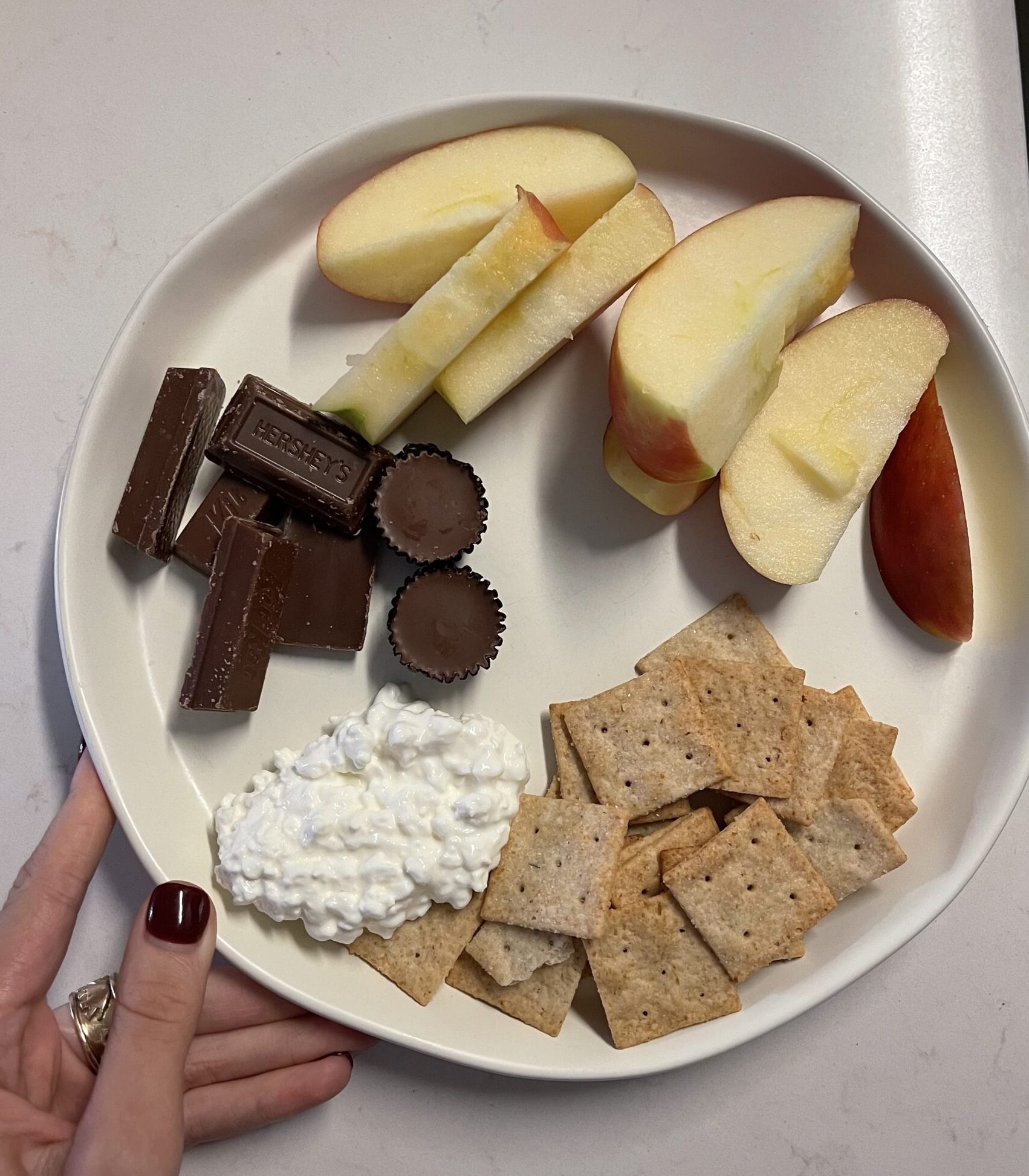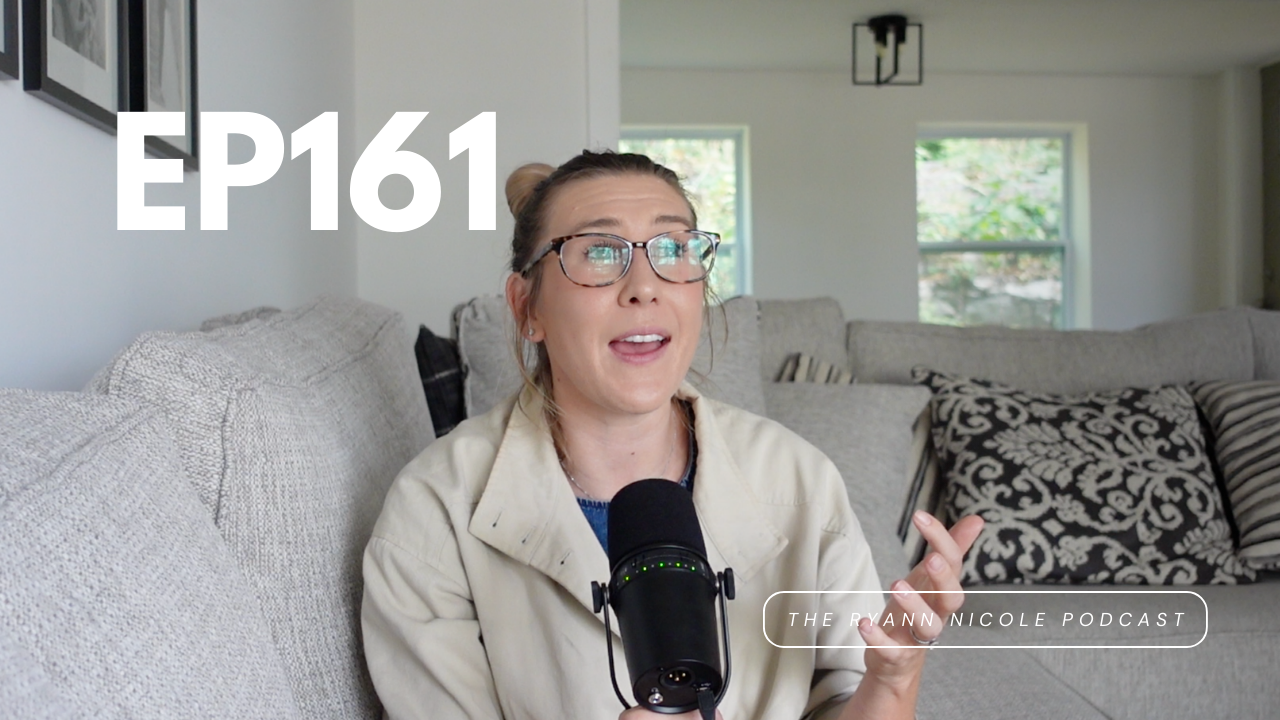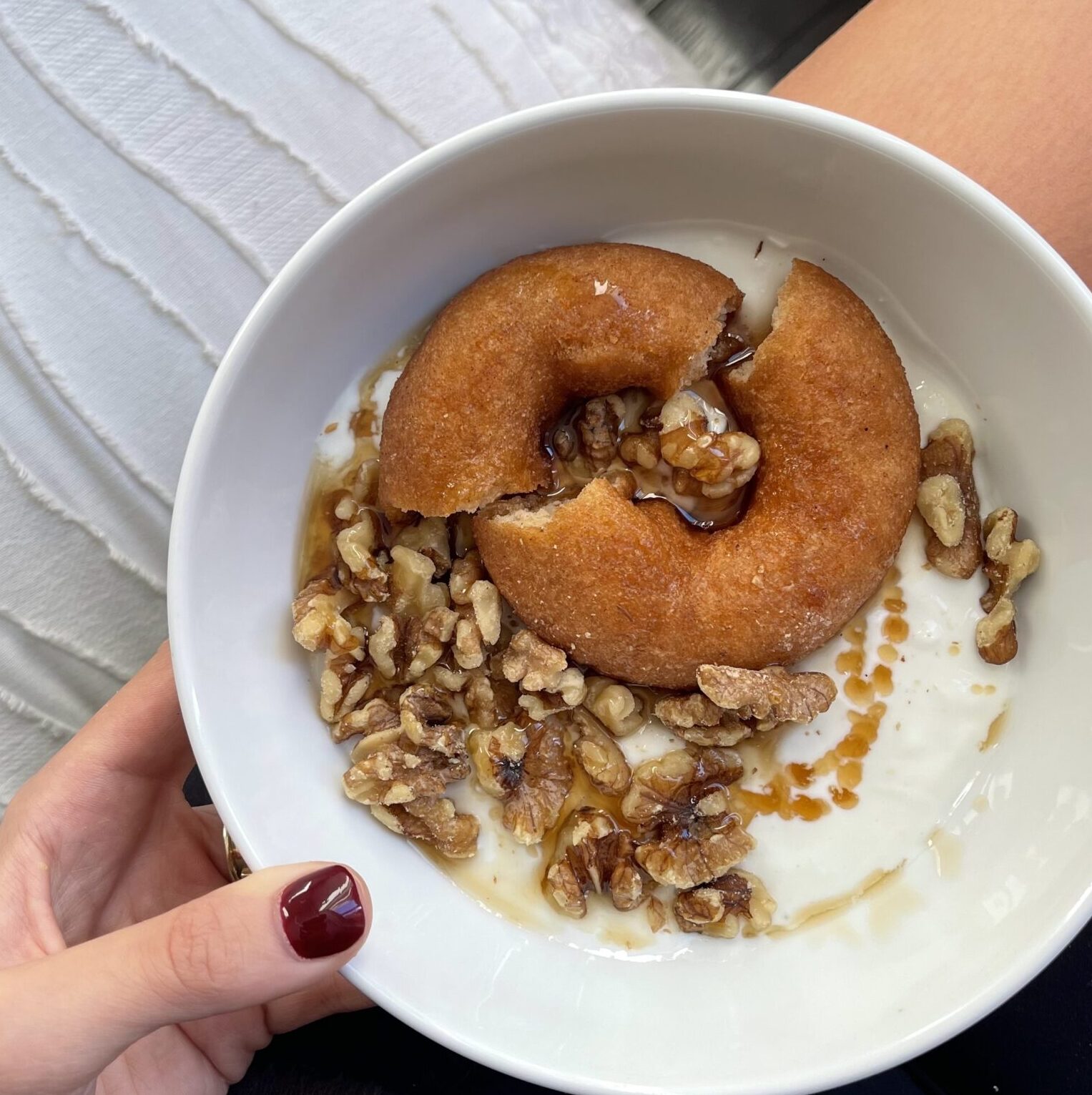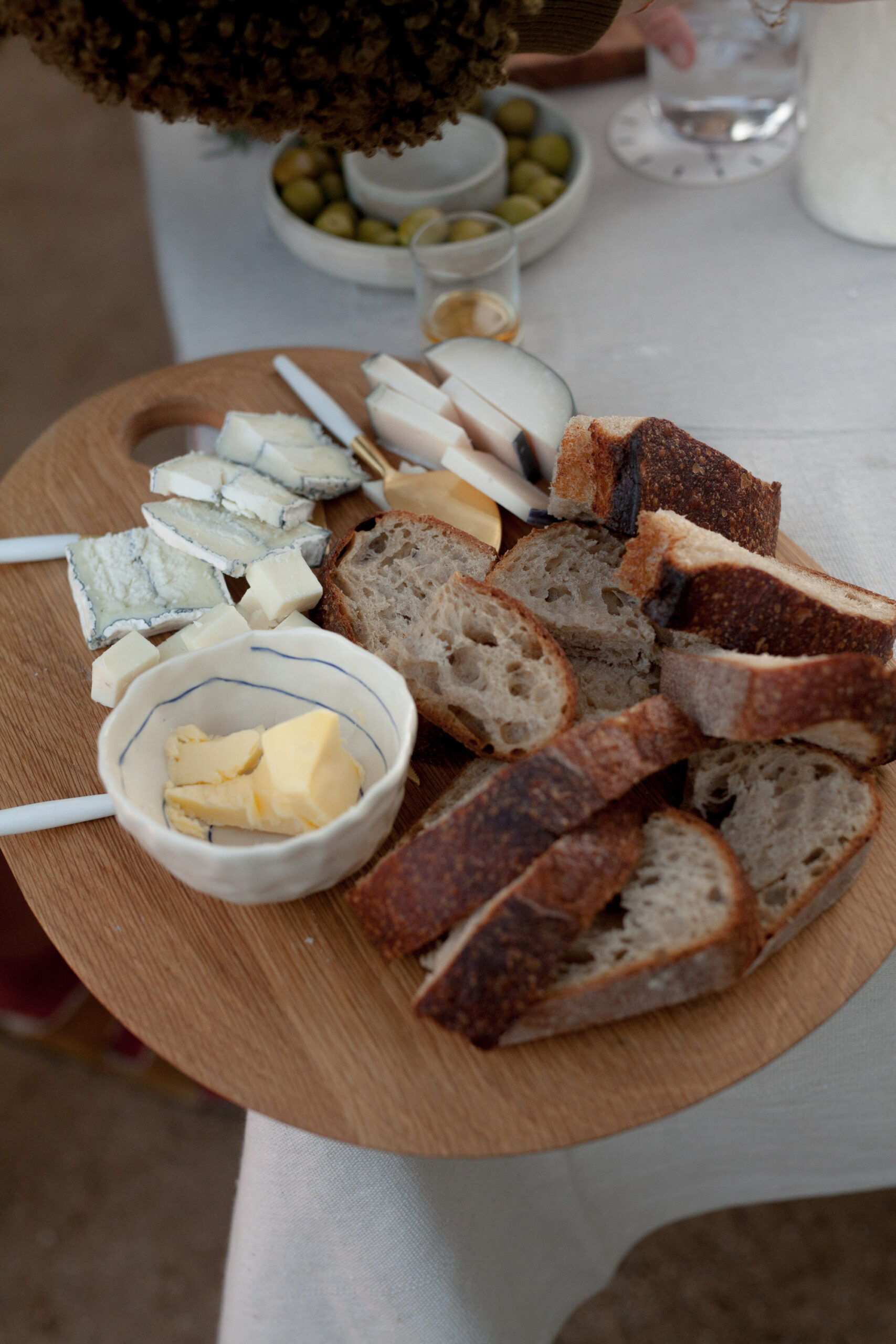Why You Feel Out of Control Around Candy (And What To Do)
October 30, 2024

Hey There, I'm Ryann Nicole.
I’m a recovered binge eater who changed the story from something that happened to me to something that happened for me. Now, I’m a licensed therapist teaching you to do the same.
My mission? To help you ditch food stress and live your life with mental peace and freedom every single day!
We are IN candy season—like all the way in it—and let’s be real, it doesn’t really stop until the first of the year. If you’re like my clients in Binge Eating Unchained, there’s probably this little voice in your head saying, “Candy is bad. Don’t eat it. Don’t let your kids eat it.” And so, you try to listen to that voice, steer clear, and then—bam—you find yourself elbow-deep in a bowl of mini Snickers.
Yep, I said it. I know you don’t want to admit it, but it’s happening, right? And probably more often than you’d like.
So then what? You blame the candy, you make it the “bad guy,” you keep trying to avoid it, and the cycle just keeps going. Every time, it reinforces that sneaky belief that candy is the problem. But, is it really?
Let’s pause and think about this for a sec. Candy is, at its core, just sugar and flavors wrapped up in colorful packaging. It’s not hiding in your pantry plotting against you. But because of how you think about candy—bad, forbidden, dangerous—it somehow takes on this power over you, filling up your headspace more than it deserves.
So, if you’re ready to stop making candy the problem and get to the real issue here, keep reading. Let’s do some perspective shifting, and maybe, just maybe, take candy off that pedestal it never needed in the first place.
5 Reasons Why You Crave Candy and How to Take Back Control
Because the truth is it’s not the candy that’s driving those cravings or leading to the binge. It’s what’s happening underneath. When we peel back the layers, there are deeper habits and beliefs at play. Let’s dig into five real reasons why candy feels so powerful—and how to work through each one, no guilt required.
1. You’re Labeling Candy as “Bad”
If you feel guilty every time you eat candy, it’s likely because you’re labeling certain foods as “good” or “bad.” Candy, of course, often lands squarely in the “bad” category. This label doesn’t just add pressure; it actually makes candy feel forbidden and, ironically, more tempting. So, when you finally “give in,” it can turn into an all-or-nothing moment where you might eat more than planned simply because you’ve already “broken” the rule.
Candy isn’t nutritionally equivalent to broccoli, but this isn’t about making candy a health food; it’s about removing the moral weight you’ve attached to it. When you stop viewing candy as “bad,” it loses that forbidden appeal. Instead, it becomes just another food choice, which takes away its power to control you.
Shift It: Try dropping the labels and seeing candy as just candy. Start practicing neutrality: next time you catch yourself thinking of candy as “bad,” pause and remind yourself it’s just food, not a moral choice. Sure, some foods nourish you differently, but they don’t make you “good” or “bad.” By breaking up with the “bad” label, you’ll feel less drawn to binge and more able to make choices that genuinely feel good.
Related Post: Why It’s So Damn Hard to Let Go of Dieting
Related Post: Why Categorizing Food as ‘Good’ and ‘Bad’ Can Lead To A Binge
2. You’re Restricting Candy to “Stay in Control”
If you’re restricting candy out of fear that you’ll lose control, that very restriction is likely fueling your binges. Tell yourself you can’t have something, and your mind will latch onto it even harder. The more candy feels off-limits, the more intense the urge to have it gets—until eventually, willpower gives out, and it’s a full-on binge. It’s a frustrating cycle that can feel endless, like trying the same thing over and over but expecting a different result.
The truth? Restricting candy isn’t helping you stay in control; it’s actually creating a stronger pull toward it. When you allow yourself to enjoy candy in moderation, it becomes a normal, enjoyable part of life. This shift removes the fear because you’re no longer viewing candy as an all-or-nothing deal.
Shift It: Rather than resisting candy, try adding it into your day without judgment. Have a piece with your yogurt in the morning or alongside lunch. Throw some into a trail mix for the afternoon. You’re teaching yourself that candy is just a choice, not something to be feared or controlled. By intentionally including it, you’ll notice cravings and the fear of losing control start to melt away.
Related Post: Food Noise: Why It Happens and How to Quiet It
Related Post: Why Intuitive Eating Isn’t Working For You *YET*
3. You’re Using Candy as a Comfort or Coping Tool
If you’re reaching for candy to soothe stress, anxiety, or boredom, candy has likely become a comfort tool. This has little to do with the candy itself and everything to do with why you’re reaching for it in the first place. In these moments, candy isn’t the problem; the real issue is why it feels so hard to sit with your emotions without trying to escape them.
But it doesn’t stop there. You feel stressed, reach for candy, then feel guilty for eating it—which only makes you feel worse. The “solution”? More candy. This endless loop isn’t really about the candy; it’s about the emotions that feel too uncomfortable to sit with.
Emotional eating isn’t inherently “wrong”—it’s natural to find comfort in food sometimes. But if candy has become your go-to, and you judge yourself for that, it’s no wonder you feel powerless around it. And once again, that has nothing to do with the candy itself.
Shift It: When you feel the urge to reach for candy, pause and ask yourself, “What am I actually needing right now?” This isn’t about making emotional eating “wrong”; it’s about finding other ways to support yourself when emotions arise. Think of a baby—when they’re having a hard time, how do you soothe them? Rocking, singing, hugging. Can you offer that same gentleness to yourself?
Related Post: Ways to Soothe Yourself That Don’t Involve Food
Related Podcast: EP157. The Real Reason You Stress Eat and How to Stop It
4. You’re Making This Into a Self-Fulfilling Prophecy
Let’s talk about the power of your mind. If you’re constantly telling yourself, “I can’t be trusted around candy,” or “I’ll lose control if I even start,” that belief reinforces itself every time you’re near sweets. It becomes a self-fulfilling prophecy: if you believe you can’t trust yourself, you’ll likely act in ways that match that belief.
Let me explain: when you believe you cannot be trusted around candy, you feel like the only way to control candy is to ban it completely. But making it off-limits only gives candy more power. Your brain naturally focuses on what you’re telling yourself not to have, making it even more tempting. The result? Candy feels like something you can’t handle, reinforcing that belief.
Your thoughts are powerful, and your brain doesn’t know the difference between real and imagined limitations—it believes what you tell it. So, if you tell yourself that you can be trusted, that candy isn’t something you need to avoid, you’re creating a new reality where you can make choices around it calmly.
Shift It: Meet yourself where you’re at by shifting your thoughts to, “I’m learning to trust myself around candy” or “I’m practicing being okay with having candy around.” This mindset allows for imperfection, takes the pressure off, and opens you up to actually practicing this in a relaxed way.
5. You’ve Been Fear-Mongered into Believing Candy is Poison
Many of us have been conditioned to believe that candy is basically poison. Somewhere along the way, we learned that a little sugar here or there is something to fear. And sure, candy doesn’t offer the same nutrients as broccoli—but poison? Labeling it this way creates a kind of fear that doesn’t stop with candy; it can snowball into anxiety around all kinds of foods and choices.
Think about it: if you view candy as poison, it’s a slippery slope to seeing everything as a potential “danger.” The blue light from your screen, the preservatives in your food, the non-organic produce in your fridge—suddenly, it feels like everything is out to get you. This mindset is exhausting, and it takes the joy out of eating. Plus, it fuels the urge to binge when you “give in” because, well, if you’ve already “poisoned yourself,” why not go all the way and then “cleanse” tomorrow?
Honestly, the cycle is far more toxic than the candy itself, wouldn’t you say?
Shift It: Practice zooming out and seeing the bigger picture. Remind yourself that candy is just one small part of your overall choices—it doesn’t need to carry so much weight. By keeping perspective, you allow yourself to enjoy candy without feeling like its a “life or death” matter.
Related Post: Why Having Dessert Every Day Isn’t a Big Deal (and Is Even Healthy IMO)
But What About My Kids?
If you’re worried about your kids overdoing it on candy, you’re not alone. It’s natural to feel cautious, especially since kids don’t always know when to stop and might eat candy until they’re sick. As a new mama, I’m also learning to navigate this, and finding that middle ground can be tricky. You don’t want to create rigid rules, but you also don’t want them to see candy as a food that’s different or “special.”
Here’s the thing: when we make candy feel like a “treat” or something they can only have after eating dinner or finishing their lunch, we’re unintentionally giving it more power. It starts feeling like the ultimate prize—something they look forward to and think about more often. So, how do we take away that “special” label? One way to neutralize candy is to serve it with their meals, not as an add-on or reward.
And if you want to set a boundary, like “just one piece,” that’s totally okay too. You don’t need to explain why or say anything about it being “bad.” A simple, “This is what’s best for our family,” is enough. The less you emphasize it, the less of a big deal it becomes.
The goal here is to avoid making candy special, so it doesn’t become something they feel the need to sneak or obsess over. By including it without fanfare, you’re teaching them that candy is just another food, no different than anything else on their plate. This helps them grow up with a more balanced, relaxed relationship with it—something we all want for our kids.
Important Note: You can’t expect your kids to have a healthy relationship with candy if you don’t. Modeling a balanced relationship with candy by working on your own is the best way to help them!
Practice Healing Your Relationship With Candy
Candy doesn’t have to be the enemy, and neither do you. When you start breaking down the beliefs and habits that make candy feel like a “forbidden fruit,” you take away its power over you. By shifting your perspective, practicing a little self-trust, and taking candy off that pedestal, you’re giving yourself (and your kids) the freedom to enjoy it without the stress and guilt that’s so often attached to it.
So, next time you find yourself reaching for a piece of candy—or watching your kids with their Halloween stash—remember that it’s okay. Candy is just candy. It’s one of many foods you can choose to enjoy in a way that feels balanced and true to what’s best for you and your family. And as you practice these shifts, you might just find yourself feeling more relaxed, more in control, and a little closer to the peaceful relationship with food you’ve been craving.
check out the pod
Ways I Can Support You
01 Coaching
Intimate group coaching to break free from binge eating
02 podcast
Real talk on food, mindset shifts, motherhood, and finding peace.
03 support group
A safe space to connect with others on the same journey.
04 free coaching
Have real conversations and hear others share their struggles.
Ryann Nicole
Licensed Therapist, Certified Nutritionist, and Virtual Wellness Coach
Ryann is a licensed therapist and virtual wellness coach who has assisted individuals worldwide in establishing a healthier relationship with food and their bodies.
Are You Ready to Heal Your Relationship With Food?
I understand—it can be overwhelming to figure out where to begin. Let's simplify things and have you start right here:
Why Am I Overeating?
First Steps To Stop Binge Eating
The Ryann Nicole
Podcast
FREE QUIZ
FREE GUIDE
Podcast
the food freedom lab podcast



